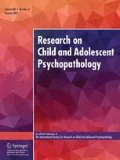Abstract
Teachers report using both reprimands and encouragement as strategies to reduce offtask behavior in the classroom. Although numerous studies have demonstrated the effectiveness of reprimands, none has examined the efficacy of encouragement. In order to answer this question, two experiments were performed. Subjects were 16 children with academic and/or behavioral problems who were assigned to one of two classes in a remedial summer program. Experiment I employed a reversal design in each class to compare either reprimands or encouragement with No-Feedback conditions. Reprimands proved superior to No Feedback in reducing offtask behavior, but Encouragement did not. In Experiment II Reprimands and Encouragement were directly compared to one another, with each class exposed to both conditions. Reprimands resulted in lower rates of offtask behavior and higher academic productivity than Encouragement.
Similar content being viewed by others
References
Conners, C. K. (1969). A teacher rating scale for use in drug studies with children.American Journal of Comparative and Physiological Psychology, 126, 884–888.
Dreikurs, R. (1968).Psychology in the classroom. New York: Harper & Row.
Jones, F. H., & Miller, W. H. (1974). The effective use of negative attention for reducing group disruption in special elementary school classroom.Psychological Record, 24, 435–448.
Lindgren, H. C. (1980).Educational psychology in the classroom. New York: Oxford University Press.
O'Leary, K. D., Kaufman, K. G., Kass, R. E., & Drabman, R. S. (1970). The effects of loud and soft reprimands on the behavior of disruptive students.Exceptional Children, 37, 145–155.
Rosén, L. A., O'Leary, S. G., Joyce, S. A., Conway, G., & Pfiffner, L. J. (1984). The importance of prudent negative consequences for maintaining the appropriate behavior of hyperactive students.Journal of Abnormal Child Psychology, 12, 581–604.
Rosén, L. A., O'Leary, S. G., & Sanderson, W. C. (1985).A survey of classroom management techniques commonly used by teachers. Unpublished manuscript.
White, M. A. (1975). Natural rates of teacher approval and disapproval in the classroom.Journal of Applied Behavior Analysis, 15, 65–83.
Author information
Authors and Affiliations
Additional information
The authors wish to acknowledge M. William Futtersak, for training the observers and aiding in the research; Ann Hession, for an outstanding job teaching; and Linda Pfiffner, for her substantive and editorial feedback.
Rights and permissions
About this article
Cite this article
Abramowitz, A.J., O'Leary, S.G. & Rosén, L.A. Reducing off-task behavior in the classroom: A comparison of encouragement and reprimands. J Abnorm Child Psychol 15, 153–163 (1987). https://doi.org/10.1007/BF00916345
Revised:
Issue Date:
DOI: https://doi.org/10.1007/BF00916345




